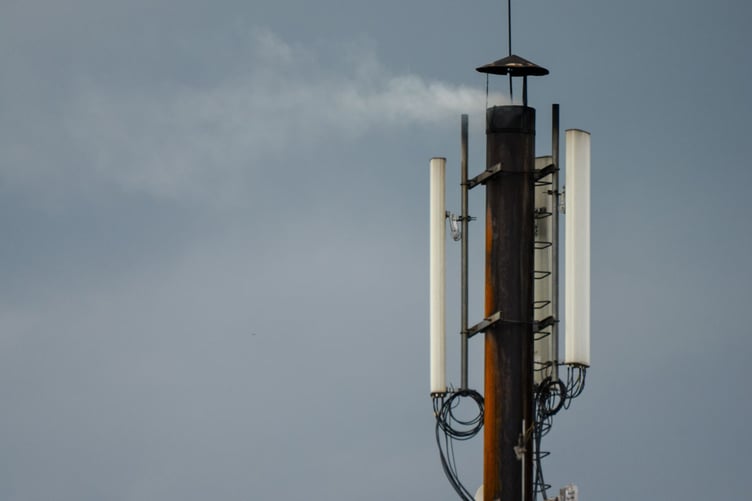WALES is deeply in love with mobile-phone technology.
That at least must be the assumption when you hear the wailing of mid and north Wales MPs over what they would have you believe is the scandal of leaving places without ultra-powerful wireless phone links.
Such connection is proclaimed as the indispensable social and economic life-force without which we wither and die or, at the very least, condemn ourselves and our children and grandchildren to lives of irredeemable deprivation reserved for those poor muts foolish enough not to recognise, and duly to adore, each and every generation of ever faster, and therefore more desirable, wireless network technology.
Oh, how exhilarating it all is as, with rapt attention, we watch 5G - the virtual equivalent of a winning Newmarket thoroughbred - steam past those former favourites, the once glorious, now fading, 4G and 3G. Our gratitude knows no bounds as 5G lays out for us the prospect of download speeds up to 100 times faster than its forerunner. How irresistible is that? And with it a box of promises for which none but the technologically primitive would be other than eternally grateful: namely, a claimed revolutionising of everyday lives, of industries and of public services. Oh, and the enabling of driverless cars. And how could we live without them?
But at what price, these miracles?
In the midst of all the adulation, the questions begin. We see ripples of discontent, heretical voices that dare to challenge the orthodoxy of unquestioning alignment with a fevered techmania.
There are the basic things: local objections to the street-level imposition of - actual or proposed - intrusive, ugly, tall and bulky 5G base-stations.
In Ceredigion, at Ystrad Meurig, residents protest about a planned 17.5-metre mast they describe as an eyesore. With complete justification, they say it would be obtrusive, too close to houses and could threaten their health.
In Cardiff, health concerns have also been raised after a plan for 14 giant 5G masts across the city - each 20 metres tall with several antennae and microwave dishes - got planning permission.
Twelve more new masts are being put up across Ceredigion and 14 in Dwyfor Meirionydd. Both areas’ Plaid Cymru MPs - Ben Lake and Liz Saville Roberts - give unqualified support to the developments. Neither seems to have engaged with the issue of health hazards but, if they have, they are maintaining a studied silence on the matter.
Yet warnings there are. One of the most worrying focuses on a study by the German Federal Agency for Radiation Protection, which found a threefold increase in malignant tumours for people exposed for five years or more to cellphone masts’ radio frequency radiation within 400 metres, compared with people living further away. Other surveys, including in Switzerland and the United States, have suggested associations with headaches, tiredness, sleep-disturbance, loss of memory, difficulty in concentrating and dizziness in people living near mobile-phone base-stations.
But perhaps the most alarming hazard - because of its enormous implications for human and planetary health - is the suggested link between base-stations and the widespread and dramatic decline in numbers and species of insects, which make up about two-thirds of all life on the planet.
A multi-university study published in Germany five years ago shocked scientists with its revelation that the abundance of flying insects had plunged by threequarters over the previous 25 years.
As both pollinators and prey for other wildlife, insects are of course crucial for life on Earth. It was known that some species, such as butterflies, were declining, but the revealed scale of losses of all insects prompted warnings that the world was on course for ecological Armageddon, with profound impacts on human society.
The data was gathered in nature reserves across Germany but has implications for all landscapes dominated by agriculture, the researchers said. The cause of the huge decline was as yet unclear, although the destruction of wild areas and widespread use of pesticides were the most likely factors, and climate change might play a role.
Then, in September 2020, came the crowning bombshell, again in a German-based study.
It said that radiation from mobile phones could have contributed to the dramatic decline in insect populations seen in much of Europe in recent years.
On top of pesticides and habitat loss, the research found that increased exposure to electromagnetic radiation is “probably having a negative impact on the insect world”. Of 83 studies deemed scientifically relevant, 72 showed that radiation had a negative effect on bees, wasps and flies, ranging from a reduced ability to navigate due to the disturbance of magnetic fields to damage to genetic material and larvae.
One scientist involved in the research said: “The subject is uncomfortable for many of us because it interferes with our daily habits and there are powerful economic interests behind mobile communication technology.”
The German report has now been augmented by warnings from Greece where, on the island of Samos, a rapid loss of insects, including pollinators, is reported following the introduction of 4G, and now 5G, networks. Insect declines are said to have reached a tipping point, with both insect-eating birds and small mammals caught up in the tragedy in steep decline.
And so to our own backyards, where Wildlife Trusts Wales points to insect populations which have suffered “drastic declines”, with far-reaching consequences for both wildlife and people. With a third of our food crops pollinated by insects, and as many as 87 per cent of our plants, there is a lot to lose. Much of our wildlife, be it birds, bats, reptiles, amphibians, small mammals or fish, rely on insects for food. Without them, we risk the collapse of our natural world.
A survey last summer by the campaigning group Bugs Matter found a 64 per cent decline in insect numbers between 2004 and 2022 across the UK.
Wales saw the biggest decrease with a 75 per cent fall in numbers, significantly worse than 2021’s 55 per cent decrease, compared with 2004 figures.
What is interesting here is that, in a largely stable Welsh countryside, one thing only has changed dramatically in recent years: the introduction and rapid spread of mobile technology.
So are we ready to contemplate a connection between this and the insects crisis?





Comments
This article has no comments yet. Be the first to leave a comment.